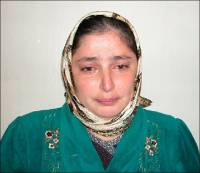Russia: 5-year sentence for human rights defender Zarema Bagavutdinova
 Zarema Bagavutdinova has been convicted in a trial which the Memorial Human Rights Centre calls politically motivated and, chillingly, on the dubious ‘testimony’ of four secret witnesses questioned behind closed doors
Zarema Bagavutdinova has been convicted in a trial which the Memorial Human Rights Centre calls politically motivated and, chillingly, on the dubious ‘testimony’ of four secret witnesses questioned behind closed doors
The Russian Memorial Human Rights Centre has condemned the sentence passed on member of the Pravozashchyta [Human Rights Defence] NGO, Zarema Bagavutdinova.
On May 21 a court in Dagestan [Russian Federation] sentenced Zarema Bagavutdinova to 5 years imprisonment. Memorial calls the criminal proceedings rigged and the sentence politically motivated.
At the beginning of her trial in December 2013 Memorial declared her a political prisoner, and says that it was clear even then that the real reason for her prosecution was her human rights activities.
The prosecution claimed that Bagavutdinova had from October to December 2011 tried to persuade a friend, Mammu Dalgatov to join an illegal armed formation, promising to marry him after that. Dalgatov was killed at the end of September 2013 during a counter-terrorist operation.
The trial confirmed Memorial’s view. The defendant’s rights were violated from the outset with the state prosecutor demanding that the trial be held behind closed doors. He argued that an open trial could lead to operational secrets being divulged and that secret witnesses needed to be questioned.
Judge N. Vagidov did not simply make certain hearings closed, but without any legal justification ruled that the whole trial would be behind closed doors.
This, Memorial says, was undoubtedly to avoid the fabricated nature of the case becoming evident during open hearings.
Information about the hearings did emerge anyway, and showed that the prosecution’s case was based on the testimony of four secret witnesses. One of the four retracted his evidence given during the investigation, saying that it had been forced out of him.
The second secret witness who is himself in custody on charges of taking part in an illegal armed formation gave extremely unclear testimony. He told investigators that he had heard Bagavutdinova persuade Dalgatov “to go to Jihad and join the Mujahideen”.
During the court hearing he could not remember the content of this conversation and asked the court to simply read out his earlier statement given to the investigator.
The third secret witness who appeared under a fictitious name and gave evidence from behind a screen, was able to say only that “according to his information, the defendant recruited into the illegal armed formation a person from Dagestan” whose name he couldn’t remember.
This third ‘witness’ was unable to describe either the man allegedly recruited, or Zarema Bagavutdinova.
Dalgatov’s relatives and friends said in court that he had held radical views and supported the illegal formation long before his alleged conversations with Bagavutdinova. There was no need for her to ‘recruit’ him.
Other witnesses for the defence described how Bagavutdinova had had difficulties with the local police because of her work. They gave examples of police obstruction of her human rights activities.
The defence asked for the police dossier on Dalgatov who was already on their records for ‘inclination to extremism’ to be presented in court. This would have provided a clear idea of when Dalgatov’s links with the illegal formation began. This would have been important additional evidence either supporting or undermining the case for the prosecution. The prosecutor objected and the judge turned down the application, showing yet again, Memorial points out, its lack of interest in getting to the truth.
Zarema Bagavutdinova has consistently denied the charges.
Despite the obviously flawed nature of the case, the court on May 21 convicted her.
The Memorial Human Rights Centre will be providing help to gain justice for Zarema Bagavutdinova. It calls on colleagues from Russian and other countries, journalists and the public at large to give this case their closest attention.





